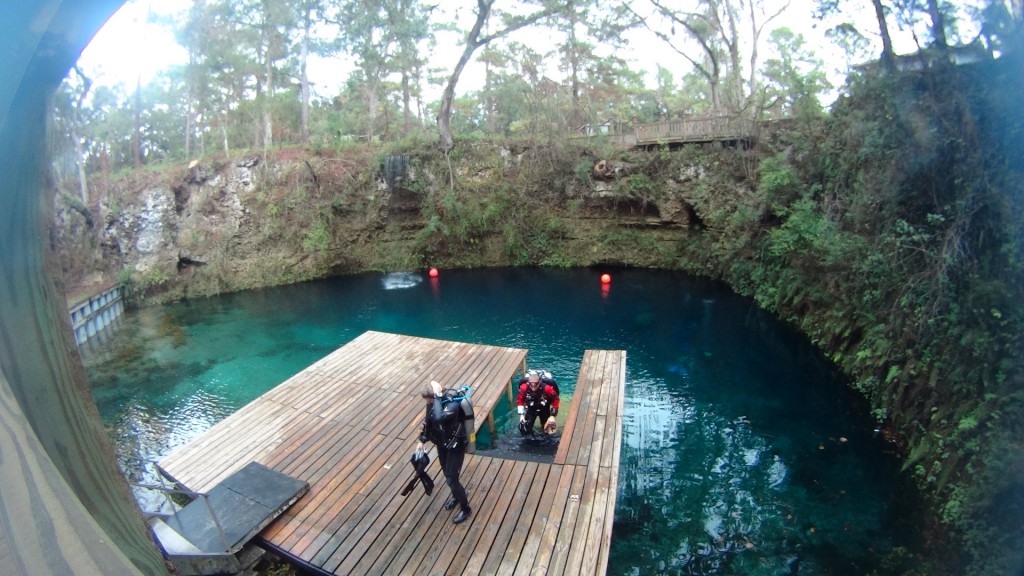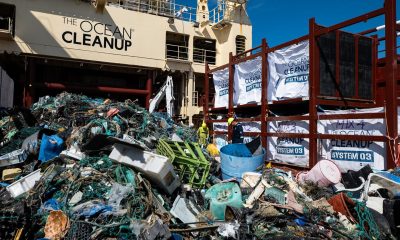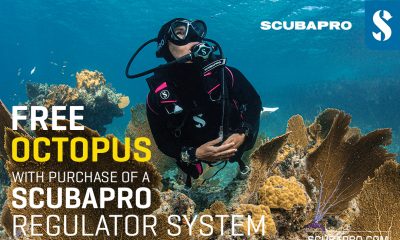News
Cave Divers in Florida ran out of air, says report

On the evening of the 25th December 2013, rescue divers found Darrin Spivey’s lifeless body floating 120 feet below the surface of Eagle Nest Sink, a popular spot for cave divers in Florida. His regulator was out of his mouth and dangling between his legs, according to a recovery diver’s interview with Detective Jill Morrell of the Hernando County Sheriff’s Office.
His body was above two reserve tanks, according to the three divers who recovered the bodies of Spivey, 35, and his 15-year-old son, Dillon Sanchez.
The sheriff’s office released the findings of an investigation into Spivey and his son’s deaths last week.
According to the report, they died accidentally after their tanks ran out of oxygen.
The diver’s equipment showed they dived down to 233 feet using air alone in their tanks. According to rescue diver Eric Deister, the men should have been using a trimix combination for their breathing supply, not air alone. Deister told investigators Spivey and Sanchez should not have ventured lower than 218 feet on the air supply they took with them due to toxic effects.
The divers believe Spivey and Sanchez, neither of whom were certified cave divers, lost track of time while exploring the caverns at Eagle Nest Sink. Spivey was a certified open water diver, and his son did not have any diving certifications whatsoever.
Because Spivey’s air hose was not in his mouth, the divers thought Sanchez ran out of air, and his father attempted to give him air using a “buddy breathing” technique.
“They (the rescue divers) further stated that they believed that Dillon panicked and attempted to swim to the surface, as he did not have his mouthpiece intact and his mask was around his neck,” the report states.
Sanchez’s body was found 67 feet below the surface.
After the divers were pulled out of the water, the rescue divers and investigators found their tanks had run out of air. Batteries from their light sources had stopped working as well.
According to Spivey’s fiancee, Holly King, Spivey and Sanchez left before 7 a.m. Christmas morning to go diving at Buford Spring, also located in the Chassahowitzka Wildlife Management Area, but found it flooded. Spivey sent a text message to King, telling her they would dive Eagle Nest, and that he would call her after.
The divers were last seen by a hunter around 11 a.m., suiting up and preparing to dive. King called law enforcement around 3 p.m. when she hadn’t heard from them, and drove out to the sinkhole cave site an hour later. She spotted their vehicle, and began contacting family members, the report shows.
Between 9 and 10 p.m., three rescue divers recovered Spivey and Sanchez’s bodies.
The men had the proper equipment to dive, but not the experience and training, according to experts.
Law enforcement did not test the air quality of the tanks, the report shows, because the medical examiner said the test results would not change the cause and manner of deaths in the case.
Spivey was a Hernando High School graduate who worked as a roofer. He was remembered as a “super father” to his children, according to his father, Chester Spivey.
Sanchez was a Hernando High School student in the ROTC program, and aspired to become a Navy SEAL.
Eagle Nest Sink does not check diver certifications. Reaching depths of 300 feet, the diving spot has been called the “Mount Everest” of cave dives. In the weeks following the accident, Florida Fish and Wildlife Conservation Commission spokesman Gary Morse said the FWC had received one request to close the diving spot (from Chester Spivey) and many requests to keep it open.
Source: www.tbo.com
Blogs
The Ocean Cleanup Breaks 10,000,000 KG Barrier

The Ocean Cleanup, the global non-profit project, has removed a verified all-time total of ten million kilograms (22 million lbs.) of trash from oceans and rivers around the world – approximately the same weight as the Eiffel Tower.
To complete its mission of ridding the oceans of plastic, The Ocean Cleanup uses a dual strategy: cleaning up the Great Pacific Garbage Patch (GPGP) to remove the plastic already afloat in the oceans, while stopping the flow of plastic from the world’s most polluting rivers.
Through cleaning operations in the GPGP and in rivers in eight countries, the cumulative total of trash removed has now surpassed ten million kilograms. This milestone demonstrates the acceleration of The Ocean Cleanup’s impact, while underlining the astonishing scale of the plastic pollution problem and the need for continued support and action.
While encouraging for the mission, this milestone is only a staging point: millions more tons of plastic still pollute our oceans and The Ocean Cleanup intends to continue learning, improving and innovating to solve this global catastrophe.
This announcement comes as governments from around the world meet to continue negotiations to develop a new legally binding instrument to end plastic pollution at INC4 in Ottawa, Canada. Representatives of The Ocean Cleanup will be in attendance and the organization will be urging decision-makers to collaborate towards a comprehensive and ambitious global treaty which addresses plastic at all stages of its life cycle and in all marine environments worldwide, including in areas beyond national jurisdiction.
It is encouraging to see that the need for remediation is reflected in the various options for potential treaty provisions. It is essential that the final treaty contains clear targets for the remediation of legacy plastic pollution, and reduction of riverine plastic emissions.
Tackling plastic pollution requires innovative and impactful solutions. The treaty should therefore incentivize the innovation ecosystem by fostering innovations that make maximal use of data, technology and scientific knowledge – such as those designed and deployed by The Ocean Cleanup.
‘After many tough years of trial and error, it’s amazing to see our work is starting to pay off – and I am proud of the team who has brought us to this point.’ said Boyan Slat, Founder and CEO of The Ocean Cleanup. ‘While we still have a long way to go, our recent successes fill us with renewed confidence that the oceans can be cleaned.’
The Ocean Cleanup was founded in 2013 and captured its first plastic in 2019, with the first confirmed catch in the GPGP coming soon after the deployment of Interceptor 001 in Jakarta, Indonesia. After surpassing one million kilograms of trash removed in early 2022, the non-profit project has since progressed to the third iteration of its GPGP cleaning solution, known as System 03, and a network of Interceptors currently covering rivers in eight countries, with more deployments set for 2024.
About The Ocean Cleanup
The Ocean Cleanup is an international non-profit organization that develops and scales technologies to rid the world’s oceans of plastic. They aim to achieve this goal through a dual strategy: stemming the inflow via rivers and cleaning up the legacy plastic that has already accumulated in the ocean. For the latter, The Ocean Cleanup develops large-scale systems to efficiently concentrate the plastic for periodic removal. This plastic is tracked and traced through DNV’s chain of custody model to certify claims of origin when recycling it into new products. To curb the tide via rivers, The Ocean Cleanup has developed Interceptor™ solutions to halt and extract riverine plastic before it reaches the ocean. Founded in 2013 by Boyan Slat, The Ocean Cleanup now employs a broadly multi-disciplined team of approximately 140. The foundation is headquartered in Rotterdam, the Netherlands.
For more information, visit: theoceancleanup.com and follow @theoceancleanup on social media.
Marine Life & Conservation
Steve Backshall to headline Shark Trust’s flagship event: For the Love of Sharks

Join a host of amazing, shark loving, speakers including Steve Backshall and the Shark Trust team for an evening celebrating shark conservation at the Royal Geographical Society in London this November.
Date: 29th November 2024
Time: 6-10pm
Location: Royal Geographical Society, London
Tickets: https://www.sharktrust.org/Event/flos24
The event will be a celebration of all things shark. Those lucky enough to get hold of tickets will hear from engaging guest speakers with a passion for sharks.
The line-up includes (*subject to change if unforeseen circumstances arise)
Steve Backshall: One of television’s busiest presenters, BAFTA award-winning wildlife expert Steve has been passionate about the wild world ever since he was young.
Steve’s impressive TV career has taken him all around the world, investigating a wide array of species and environments. Steve has filmed over 100 hours of children’s wildlife programmes with the BAFTA award winning Deadly 60 franchise and recently, with Sky Nature, for his new series ‘Whale with Steve Backshall’. He has been a patron for the Shark Trust for 10 years.
Simon Rogerson: is a photojournalist specialising in natural history, diving and the sea.
He is editor of SCUBA magazine, the official journal of the British Sub-Aqua Club. Simon started his career as a crime reporter but gravitated towards his ‘less depressing’ interest in underwater exploration, joining the staff of DIVE magazine in 1999. In 2005 he was named ‘Editor of the Year’ in the PPA’s Independent Publishing Awards. Simon also works as a freelance writer, contributing frequently to the Sunday Times and Telegraph, in addition to BBC Wildlife, Esquire, and a host of international diving magazines. He is the author of a book, Dive Red Sea, published by Ultimate Sports. Now based in Berkshire, Simon has been a Patron of the Shark Trust for 20 years.
More speakers to be announced soon. Head to the Shark Trust website to learn more.
The evening will also allow guests the final chance to see the Oceanic 31, shark art exhibition. Some of the artwork will be auctioned/raffled at the event, while the rest will be auctioned online to raise money for the Shark Trust Oceanic Programme.
For the Love of Sharks is an evening with something for everyone who is interested and fascinated by sharks. Join the Shark Trust, their Patrons, Trustees and Staff, along with a host of supporters for this celebration of shark conservation.
For more information or to buy a ticket: https://www.sharktrust.org/Event/flos24
-

 News3 months ago
News3 months agoHone your underwater photography skills with Alphamarine Photography at Red Sea Diving Safari in March
-

 News3 months ago
News3 months agoCapturing Critters in Lembeh Underwater Photography Workshop 2024: Event Roundup
-

 Marine Life & Conservation Blogs3 months ago
Marine Life & Conservation Blogs3 months agoCreature Feature: Swell Sharks
-

 Blogs2 months ago
Blogs2 months agoMurex Resorts: Passport to Paradise!
-

 Blogs2 months ago
Blogs2 months agoDiver Discovering Whale Skeletons Beneath Ice Judged World’s Best Underwater Photograph
-

 Gear Reviews3 weeks ago
Gear Reviews3 weeks agoGEAR REVIEW – Revolutionising Diving Comfort: The Sharkskin T2 Chillproof Suit
-

 Gear Reviews3 months ago
Gear Reviews3 months agoGear Review: Oceanic+ Dive Housing for iPhone
-

 Marine Life & Conservation2 months ago
Marine Life & Conservation2 months agoSave the Manatee Club launches brand new webcams at Silver Springs State Park, Florida

















